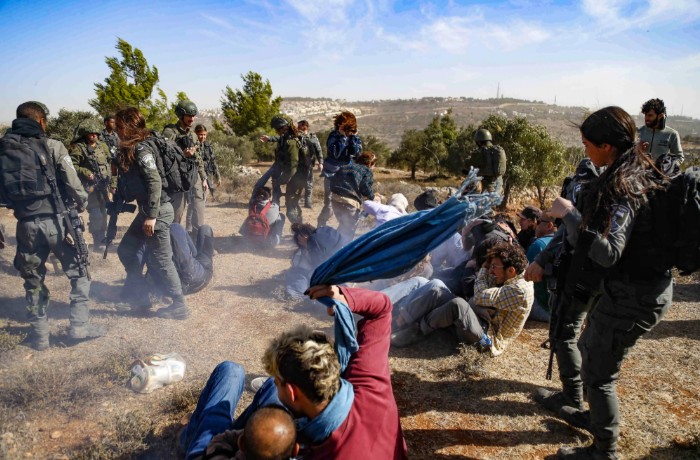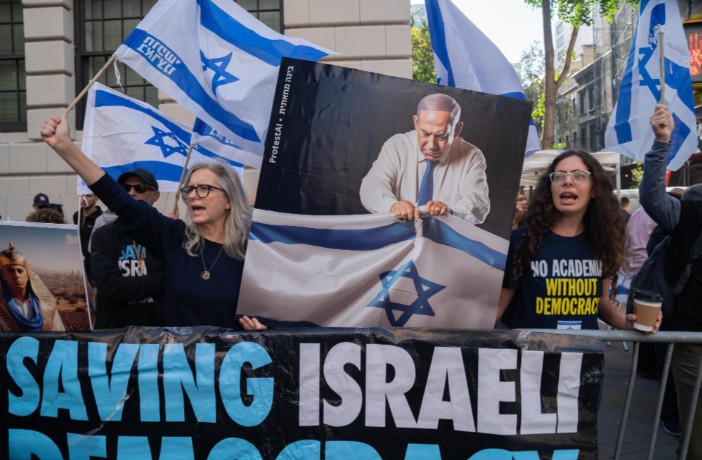Like many popular struggles for liberation throughout history, the Palestinian fight against Israeli apartheid is defined by a confrontation between two distinct sides: oppressor and oppressed. Yet, like in almost every other instance — from the South African anti-apartheid movement to Algerian resistance to French colonialism — some individuals from within the ruling side have blurred this divide, choosing to oppose the mechanisms of domination and disassociate themselves from the actions of their own society.
This recurring phenomenon has consistently forced liberation movements to address difficult questions: Should they embrace dissenting voices from the oppressor’s camp or regard them with suspicion? Does active solidarity from the other side strengthen their movement or risk undermining it?
Today, the approximately 7 million Jews and 7 million Palestinians who live between the Jordan River and the Mediterranean Sea are effectively under total Israeli control. While all of Israel’s Jewish residents, including settlers in the West Bank, enjoy full rights as citizens, Palestinians are divided into several categories — all inferior in status to Israeli Jews by varying degrees.
In the West Bank, where Israel is well on its way to annexation, the settler population has grown from 100,000 during the Oslo Accords to approximately 700,000 today. Many of the settlers are armed, backed by the state, and hold positions of political and military power. Leaders of the messianic right, once cautious in revealing their true intentions, now openly promote ethnic cleansing and Jewish supremacy.
One of the main tactics used to cover up this ongoing and accelerated colonization is to present it as conflict based on “misunderstandings” or “prejudices” between Israelis and Palestinians. This is an attempt to normalize oppression while shifting the discussion towards “relations” between people. But it’s clear that as a Palestinian, I’ll have negative feelings towards Israelis as long as they continue taking over my land and live in my house. First, we’ll need to address this colonial reality — and only then can we talk about our relations and feelings.
Just like young Palestinians did not choose to be born in the West Bank, in Gaza, or in exile, young Israelis, some already the third or fourth generation of colonial settlement, did not choose to be born into this political reality. Nevertheless, they must choose how to respond: Will they take part in it, preserve its mechanisms of oppression, and benefit from the privileges it grants them? Or will they choose to resist it — and potentially at great personal cost?

Identifying allies
In French Algeria, although the indigenous population led their own liberation struggle, a small group of French communists, leftists, and intellectuals supported the National Liberation Front (FLN) and even sacrificed their lives for Algerian independence. Groups like the Jeanson Network, and individuals like Fernand Iveton and Henri Maillot, aided the FLN by smuggling weapons, funding operations, and participating in armed resistance.
Others, like lawyer Gisèle Halimi, defended FLN members in court and exposed French torture practices. Influential intellectuals including Jean-Paul Sartre and Simone de Beauvoir wrote powerful critiques of colonialism; Sartre, in particular, became a target of the pro-colonial OAS for his outspoken support for Algerian independence. Viewed as traitors by French authorities, these activists are remembered in Algeria as important allies who stood against the dominant colonial view of the French state and settler population.
Similarly, in apartheid-era South Africa, a minority of white activists joined the Black liberation struggle, and several became key figures; Joe Slovo led the ANC’s military wing, journalist Ruth First was assassinated for her activism, and Helen Suzman challenged apartheid from within parliament. Most Black South African leaders, led by Nelson Mandela, endorsed interracial cooperation, insisting the fight was against apartheid, not white people. And for many of its members, the ANC’s multi-racial stance helped show that apartheid wasn’t universally accepted, even among the white citizenry.
This approach faced skepticism from more militant factions, who questioned whether white allies could truly transcend their privilege, feared security breaches, or doubted their revolutionary commitments. Yet many white activists proved their dedication, with some paying the ultimate price. After apartheid ended, South Africa’s Truth and Reconciliation Commission honored the contributions of these white allies, many of whom helped shape the new democratic state.
When considering the Israeli-Palestinian context, it is first important to identify the Israelis who are potential allies in the Palestinian struggle. What has historically been referred to as the “Zionist left” mostly comprised political organizations that, while sometimes advocating to end the occupation, fundamentally accepted Israel’s ethno-national framework. Their rhetoric, which consistently called to “preserve Israel’s Jewish character,” inherently denied the right of return for Palestinians displaced in 1948. In doing so, these Israelis have aimed to maintain Israel’s Jewish-supremacist structure while attempting to prevent its slide into overt apartheid, a development that could damage the Jewish state’s international image.
Rather than challenging Zionism’s colonial foundations, the distinction between this “left” and Israel’s messianic right has ultimately been about tactics: whether the 1948 ethnic cleansing had sufficiently secured Jewish dominance, or whether additional expulsion of Palestinians — from the West Bank and Gaza, and even Israel’s internationally recognized borders — remained necessary.

By comparison, radical Israeli groups such as Matzpen, Yesh Gvul, Ta’ayush, and Combatants for Peace have refused ethno-nationalist supremacy altogether. From leading protests and refusing military conscription to conducting solidarity work with Palestinians in the occupied territories, these organizations have devoted their energies to fighting Israeli occupation through nonviolent resistance. In the past (though to a much lesser extent today), these groups maintained ties with Palestinian organizations and were even acknowledged by the PLO as potential allies. Israeli activists who joined demonstrations in the West Bank and previously in Gaza have at times paid a steep personal price, even as their numbers within Israeli society have steadily diminished.
Conditions for co-resistance
The crucial question is not whether there is room for joint struggle with Israelis, but what conditions must exist to ensure that such cooperation truly promotes liberation and equality.
First, any Israeli Jew who chooses to take part in the struggle for Palestinian liberation must recognize that they are not an “external supporter,” but someone taking responsibility for a system from which they benefit and which operates in their name. While the Palestinian fights for their own freedom and national liberation, the role of the Israeli is to actively refuse complicity in maintaining the apartheid regime and the ongoing injustices it commits. This is a partnership grounded in shared political and practical goals, but it is not symmetrical — each side has a distinct role shaped by its own historical and national reality.
Second, there must be full recognition of the historical injustice caused to the Palestinian people with the establishment of the State of Israel, including their expulsion and dispossession from their land. This recognition must be accompanied by a real willingness to act to correct the injustice — including through the redistribution of land and other resources to account for Palestinian dispossession, without depriving Jewish Israelis in the process. Such a utopian arrangement may be hard to imagine now, but when there is true political will, practical pathways for redistributive justice can be found.
Third, there must be mutual recognition of both peoples’ right to live in the land. For Palestinians, this right stems from their place as the indigenous population, including those who were expelled and remain in exile, as well as the Jewish-Palestinian minority that lived here before the first Zionist settlements. For Israeli Jews, it is derived from their long-term presence in the land over several generations.
Fourth, the belief that Jewish control is an existential necessity must be abandoned. The idea that a Jewish state is essential to the survival of Jews in this land is not only mistaken, but sustains a system of oppression. Indeed, ethnic supremacy ensures the continuation of Palestinian resistance, as long as we are denied equality in our own homeland. A just and peaceful future requires recognizing Palestinians and Jews as two equal peoples, and building a political partnership instead of maintaining a regime of Jewish domination. Justice and equality are not favors granted from one side to another — they are shared interests. Only a society that dismantles ethnic privilege can provide true stability and security.
Fifth, a new political structure must be created, one that reflects the existence and cultural, political, and material needs of both peoples living between the river and the sea, alongside other minority communities. This structure must address and rectify the historical injustice inflicted upon Palestinians, not by creating new injustices, but through a fair redistribution of power and resources.
The number of Israelis who hold and act upon these principles remains very small today. Most Israelis, whether they acknowledge it or not, are participants in the apartheid system. Still, it is vital that the Palestinian position remains principled and rooted in clear values. The path forward should respect and encourage joint resistance, but only on a foundation of sound principles. This is a struggle against apartheid, and it must be waged in partnership with all who truly oppose it.
A version of this article was first published in Hebrew on Sabra. Read it here.
[Fadi Shabita holds a master's degree in conflict resolution and is a political and social activist and software engineer.]
Our team has been devastated by the horrific events of this latest war. The world is reeling from Israel’s unprecedented onslaught on Gaza, inflicting mass devastation and death upon besieged Palestinians, as well as the atrocious attack and kidnappings by Hamas in Israel on October 7. Our hearts are with all the people and communities facing this violence.
We are in an extraordinarily dangerous era in Israel-Palestine. The bloodshed has reached extreme levels of brutality and threatens to engulf the entire region. Emboldened settlers in the West Bank, backed by the army, are seizing the opportunity to intensify their attacks on Palestinians. The most far-right government in Israel’s history is ramping up its policing of dissent, using the cover of war to silence Palestinian citizens and left-wing Jews who object to its policies.
This escalation has a very clear context, one that +972 has spent the past 14 years covering: Israeli society’s growing racism and militarism, entrenched occupation and apartheid, and a normalized siege on Gaza.
We are well positioned to cover this perilous moment – but we need your help to do it. This terrible period will challenge the humanity of all of those working for a better future in this land. Palestinians and Israelis are already organizing and strategizing to put up the fight of their lives.



Spread the word